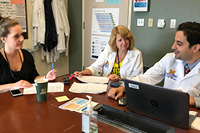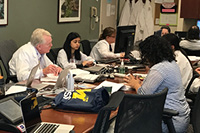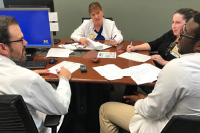


Director: Anupama (Anu) Goyal, MD, MPH
In recognition of the symbiotic relationship between clinical care and the academic mission, faculty in the Division of Hospital Medicine also staff an attending inpatient service - the Medicine Faculty Hospitalist (MFH) service. Growing from eight faculty in 2003, the service is now staffed by over sixty faculty, discharging over 8000 patients per year, with dedicated nocturnists who admit most of our new patients in the evenings and at night. Our maximum number of patients per faculty hospitalist is 11, allowing adequate time for high quality care for our complex patient population.
To support our clinical activities, the service is complemented by dedicated case managers, clinical assistants, and a number of dedicated clinical pharmacists. Daily multidisciplinary discharge rounds for all service patients focus on aspects such as reason for hospitalization, barriers to care delivery, transition issues, and expected day of discharge to facilitate collaborative care. Pharmacy rounds occur on weekdays and cover myriad aspects including appropriate antibiotic use, management of anti-coagulants, intravenous antibiotics, intravenous nutrition, and medication dosing.
As the largest service in the hospital, we participate in many ongoing quality improvement initiatives such as priority discharge (identifying 20 patients a week that could be discharged early the next morning), antibiotic stewardship, and pharmacy-physician medication reconciliation for patients with high LACE score at high risk for re-admissions.
The MFH faculty mentor teaches and closely supervises a variety of learners including medical students, in addition to students from the Acute Care Nurse Practitioner (ACNP), Physician Assistant (PA) and biomedical engineering programs at the University of Michigan. Several students have described this rotation as “the best rotation of their training” because of the following attributes:
- Direct 1:1 attending-learner interaction(s)
- Hands-on learning
- Unparalleled autonomy
- Vast opportunities for learner entrustment
- Flexibility in tailoring learning and clinical care to the learner’s goals, gaps in knowledge and skills
- Exposure to multiple practice styles and patient types
- Superior mentoring and career advice



